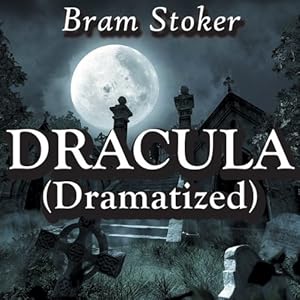
- Audible Audio Edition
- Listening Length: 12 hours and 28 minutes
- Program Type: Audiobook
- Version: Unabridged
- Publisher: BN Publishing
- Audible.com Release Date: December 8, 2011
- Language: English
The classic vampire story by Bram Stoker revolves around a struggle
between good and evil, tradition and modernity, and lust versus
chastity. The author didn't invent vampires, but his novel has so
captured the public's imagination that he is rightly considered their
popularizer. Listen and you will meet not only the Count himself, but
heroes Jonathan Harker and Abraham Van Helsing, plus an array of madmen,
psychiatrists, and fair maidens who cross paths with the fanged menace.
©2011 BN Publishing; (P)2011 BN PublishingBram Stoker's Dracula is, hands down, the greatest horror novel ever written. In addition, it is also an enduring classic of literature. You may have seen every Dracula movie ever made, but you do not know the real Count Dracula until such time as you have read Stoker's book. Of course, unless you have been living under a rock, you will know the general plot line, but I assure you there is a wealth of rich material buried throughout the text that is sure to excite, intrigue, and surprise you. Perhaps the ending is a slight anticlimactic, yet I, having read this novel before and being quite familiar with the Count, read the final pages with bated breath, an anxious mind, and the sense of exhilaration that only the most talented of writers can induce.
The most striking characteristic of Stoker's masterpiece is its solid grounding in late 19th-century Victorianism. This may prove frustrating to some readers. It is far from uncommon for the men in the tale to weep and bemoan the dangers threatening the virtuous ladies Lucy and Mina; virtue and innocence of women are hailed rather religiously. Mina, for her part, assumes the role then deemed proper for women, accepting and praising the men for their protection of her, worrying constantly about her husband rather than herself, shedding tears she must not let her husband see, etc. Yet, it is most interesting to see Mina rise above the circle of a woman's proscribed duties; she in fact becomes a true partner in the effort against Dracula, expressing ideas and conclusions that the men, with all of their wisdom, could not come up with themselves.
Another thing I find interesting is the lack of a clear protagonist in Dracula. Technically, I suppose, Jonathon Harker is the protagonist, but Mina, Dr. Van Helsing, Dr. Seward, and the Count himself basically operate on an equal plane with him. It is Van Helsing who can be described as the anti-Dracula; he plans the moves by which he and his friends seek to thwart the Count's plans and destroy him; the second half of the novel can be compared to a chess match between two equally strong competitors. Minor characters such as the lunatic Renfield are also drawn clearly in our mind's eye by Stoker's incredible gift of characterization. While the format is unusual--the novel consisting fully of diary and journal entries by different characters--you cannot help but be drawn in closely to the group of heroic souls who pledge their very lives to one another as they take it upon themselves to combat a centuries-old evil.
One could expound upon a number of themes in this novel (and many literary critics have certainly done so), so I will just quickly mention a few. Is this an erotic story? Certainly, to some extent, but there is certainly nothing overtly sexual in these pages. Is it really horrible? One might wonder how much blood one would encounter in this product of the Victorian age, but there are indeed some rather shockingly gruesome descriptions of events--nothing to shock modern readers but probably quite surprising to Stoker's contemporaries. There are also subtle overtones of religion in these pages. Aside from the Christian objects that have the power to keep vampires at bay, the most striking scene in the novel is Dracula's perversion of the Lord's Supper in his own most nefarious deed.
I cannot recommend Stoker's masterpiece highly enough. The impatient reader may encounter sections that move too slowly than he/she would like, but such lulls are always wiped away by sudden spurts of activity and drama. Feminists will dislike the Victorian characterization of the women but can find unexpected pleasure in the strength and intellect of Mina. Literary critics will surely find in these pages a deep ocean of issues ripe for analysis. Of most importance, the common reader will find an absorbing storyline which may horrify him/her to some degree in places but which will certainly offer great rewards of enjoyment. I think most individuals would be won over completely by the great humanity of these characters and the unexpected richness and complexity to be found in this story of a fiend they thought they already knew.
"Easily the best horror novel ever written"
By
Daniel Jolley "darkgenius" (Shelby, North Carolina USA)
No comments:
Post a Comment